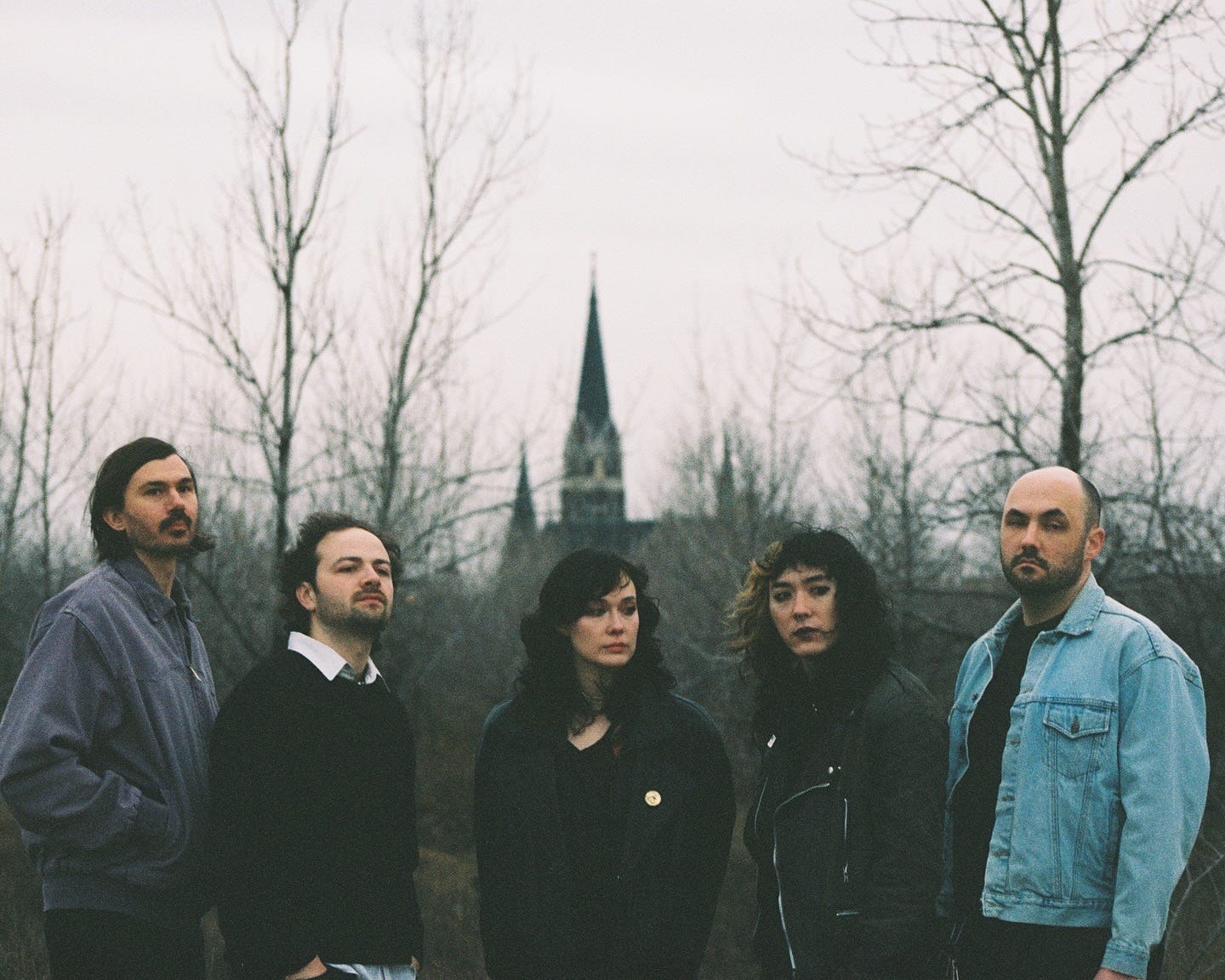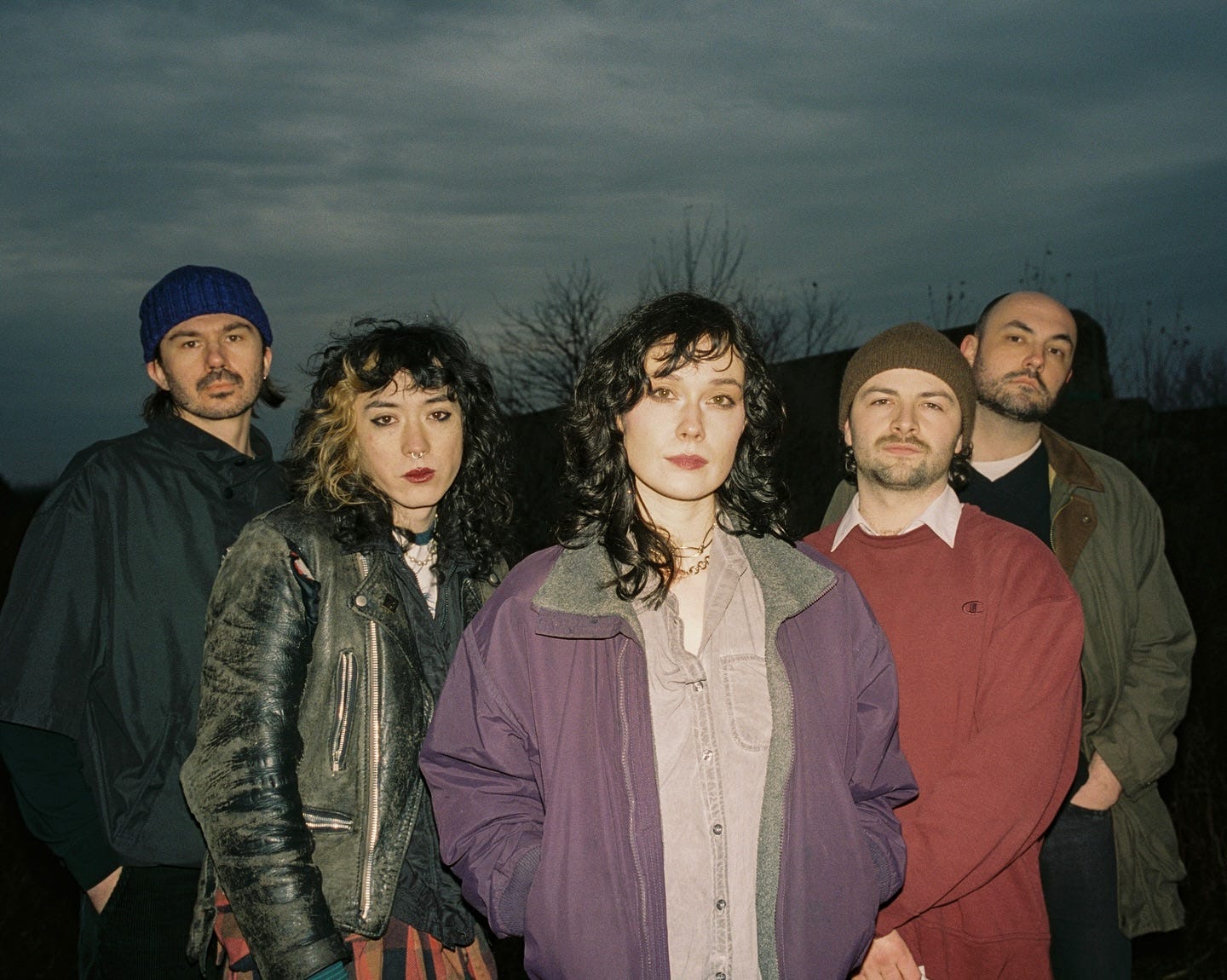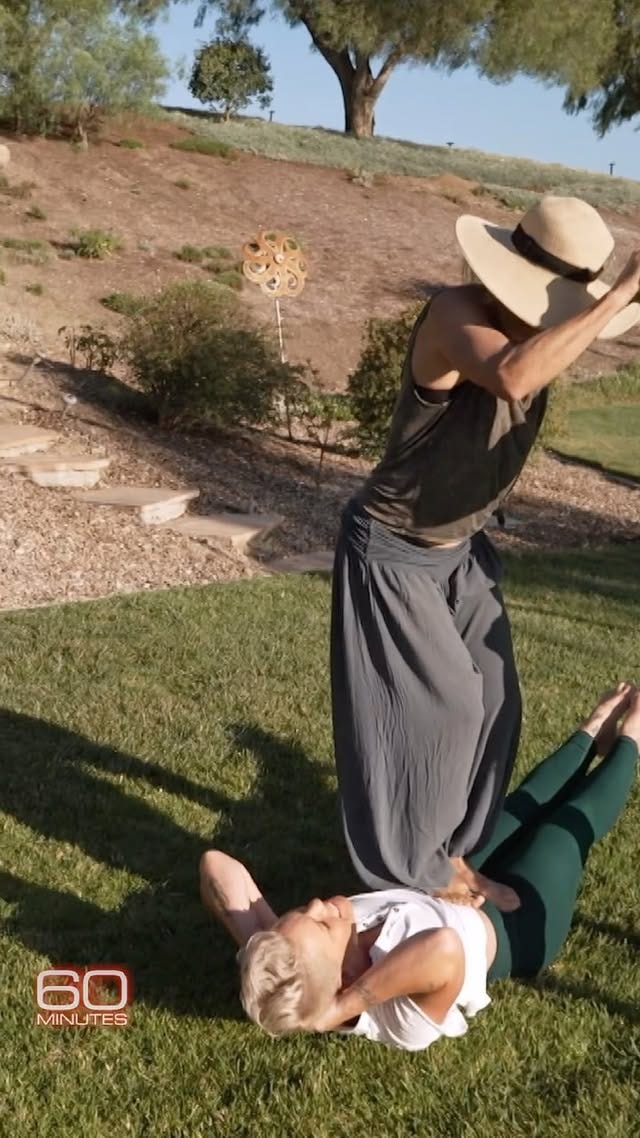Smut: All I want is to mean what I’m saying
A conversation with singer and lyricist Tay Roebuck
Welcome to Human Pursuits, the column that features need-to-know names and stories in media and other creative spaces. Today, Smut singer and lyricist Tay Roebuck on finding success in your 30s, channeling Gerard Way, referencing Icarus, and getting a 7.4 from the ‘fork.
Shortly after my call with Smut’s front woman, Tay Roebuck, I received an email from her publicist, Patrick, checking in.
Interview went great, I replied. Tay is a star. I predict big things.
There’s a lot of indie rockers out there. Fewer indie rockstars. So when I tell you that Roebuck has it — the goods, the rizz, the chutzpah — I mean it.
Roebuck is a star, not because of some indefinable je ne sais quoi, but, I think, because she and her band have a sense of grandeur about them. They’re a little band that takes big swings. Expresses big emotions. Twenty years ago, their third album, Tomorrow Comes Crashing, probably would’ve labelled them the next big thing.
Admittedly, it’s hard to imagine a band called Smut gracing the front page of Rolling Stone, or topping the Billboard Hot 100. But what's in a name? Listen to the songs. Many of them remind me of early 2000s emo. Sort of like if Rainer Maria was really into My Chemical Romance and At The Drive-In. There are choruses, but they’re slightly obscured. Guitar solos that are less so. Screaming that is right in your face.
I like the album, in other words. And so, we had much to discuss.
Our edited and condensed conversation touched on the band’s move from Cincinnati to Chicago, how her recent nuptials have informed her creative practice, the meaning of life, and more.
ES: You’re in Chicago, right?
TR: I am. Our whole band moved here five years ago. Time flies. We moved during the pandemic. It feels like two years, but it’s been way longer.
ES: My wife and I were talking about that the other day. I'm 34, but I feel 31. That three-year gap is what we lost.
TR: I agree, I talk about that all the time.
ES: And you’re from Cincinnati originally?
TR: Andie and Sam are from Cincinnati. I'm from Louisville, Kentucky.
ES: Oh shit, go Cardinals!
TR: I did not go to Cardinals games. Laughs. Our rhythm section is from New Jersey and California. We’re from all over.
ES: You’re America's band, really. You’ve got all the bases covered. Except for the South.
TR: I'm technically from the South, but the very tippy top.
All I want is to mean what I’m saying and have fun performing what I’m saying.
ES: What was life like in Louisville?
TR: It was wonderful. It's a great place to grow up and then leave when you're an adult. I liked it a lot. I lived there during the recession. A lot of businesses were closing and trying to reopen. There was this massive drug epidemic in Louisville when I was in high school. I turned 18 and decided I should move away. Now I think it’s so beautiful and lovely, but there was a dark period there.
ES: My wife and I were just back in our hometown for a wedding, and we always wonder what life would be like if we were there in our 30s. The cost of living certainly feels more approachable, especially for someone doing creative work. Do you ever consider going back to Kentucky? Or is that chapter of your life closed?
TR: That's a good question. When I go back, I think, “Wow, it's so cheap to live here.” But I keep moving to more expensive places because I keep getting better opportunities. Laughs. What would I do if I moved back to Louisville? Work at a bar? I don’t see a lot of mobility there for me at the moment.
ES: How has Chicago inspired you as an artist?
TR: It definitely put the pressure on me, which I need to function. Like, don't tell me I have all the time in the world to do something because I will take it.
When we arrived here, it felt like we were surrounded by bands moving at breakneck speed. We spent nearly a decade, bopping around, taking our time. We were so lucky in the early days because we were getting asked to go on tour with bands that we liked. We thought everything worked at this slow and steady pace. But that’s not really the case; we need to practice three times a week and apply for things, and work on things 24/7. Now we do that, and we’re better for it. It’s better for us to have that pressure on ourselves. Chicago taught us that it takes a lot more effort than we had been giving it.
ES: That’s such a common trajectory for creatives. You whittle away at something for years and build your skillset until suddenly you’re confident enough to view it as a serious venture. And that’s when things get really interesting.
TR: Very much so.
ES: I'm envious of people who create in groups, though. As a writer, it often feels like I’m in the trenches by myself. I think it’s so nice that bands can divvy up the labour and draw inspiration from each other.
TR: Yes. The greatest blessing of our band is that we're fully collaborative. I don't know if any of us would be able to do it alone. Some musicians operate that way. They write all the songs and play all the instruments, and then they hire people to go on the road. With us, it’s like… I don’t know how to play drums, you know? Everyone has their own thing that they’re really good at. We get to pile ideas on top of each other. That’s how we get a song like “Syd Sweeney”. It turns into a metal song for the last minute because Sam and Andie were really into metal when they wrote it.
ES: I want to ask you about being a frontwoman and a woman in music. Do you feel welcome on stage in 2025? Are we regressing at all?
TR: Personally, I think it’s a great time to be a woman in music. When we started, we were playing our little punk shows. Every band in Cincinnati had a woman in it, so I felt kind of spoiled. I didn't understand how that wasn’t true other places, especially in the 2010s, and especially with indie rock and punk.
I feel like women are the people to beat in music right now. Most of the mid-year best of lists published in the past month have been weighted with bands that include female front persons. I don't think this is because we've got more to say. If anything, it’s because we unfortunately live in a very visual aesthetic time. Girls are a little better at honing a niche that they can fit into, which I’ve always had a problem with… For me, the visuals are in the songs. I don't know what outfit I'm supposed to wear to convey that message. Laughs.
But, yeah, I think the social media generation lends itself to women getting better opportunities. And it’s a double-edged sword, because you have to be an attractive woman, and you have to be perfect in whatever niche you fill, otherwise you don't have a shot, whereas guys can be really ugly.
ES: Laughs. So ugly.
ES: How old are you?
TR: 31.
ES: For some reason, your record got me thinking about aging. How do you feel about getting older?
TR: It was something I was really scared of until I turned 30. And then overnight it was like, “Oh well.”
ES: You realize it’s not that bad.
TR: Yeah. People walk around thinking they need to accomplish a lot before they're 30, but you wake up and everything's exactly the same. You realize you could just do whatever you want forever. Laughs.
ES: I agree. We have this idea that nothing interesting ever happens after your thirties, which is completely wrong. Most people’s most interesting creative work starts in their thirties.
TR: Heading into my 30s, I was looking to musicians like Blondie. People who started to gain popularity in their 30s. You never think about those people. I also think lately most bands that break through are in their 30s, because that's how long it takes nowadays. You need a decade of grinding.
ES: And part of that is probably because most bands aren’t able to focus solely on music right now. It’s way harder to put your life on hold for two years and go on tour and push songs to the radio. It’s easier to spread it out over four or five years, and then suddenly your band is breaking.
TR: Exactly. We all have full-time jobs. I have to pay rent before I work on music.
ES: Are you sitting in accounts payable like, “They don’t know I’m in Smut right now?”
TR: I work at a clothing store. I’m a customer service lifer at this point because it allows me to take time off for band stuff. But when we got our Pitchfork review, I joked that I was ringing someone out, and they didn’t know I got a 7.4. Laughs.
ES: I saw that score! No pressure to talk Pitchfork, but I was thinking how bands probably feel some pressure to celebrate any review from them that isn’t a straight-up pan.
TR: We were dissecting it as a band, and looking up our peers. We decided that, for indie rock, it’s the highest score you can get right now. People don’t want indie rock as much as they want, say, hyperpop right now. Other genres tend to get higher scores, I think.
ES: It's such a weird game that you guys have to play with that publication.
TR: The big fear is that you put so much of yourself into the record, and then it gets released and Pitchfork or some other publication destroys it. We were basically hoping to avoid a bad score.
ES: And to be clear, this isn’t just Pitchfork. Other reviewers do the same thing.
TR: I feel like music reviews often really don’t like catchy stuff. They almost see it as low-brow. We kept getting reviews that said, “They’re not reinventing the wheel.” Like, okay. We’re making a rock album.
ES: And you never claimed to be reinventing the wheel!
TR: It feels like such a lazy critique of all music, because who is reinventing the wheel at this point? Some of the last big waves were like Mac DeMarco, and then Phoebe Bridgers, who were both still just singer-songwriters.
ES: And they were building off people who came before them.
TR: The last big thing was probably Sophie with hyperpop, but even that was 10 years ago. I don't really hear anything new, and that's not a bad thing.
ES: I think you're an incredible lyricist, and I was wondering, are you referencing poems or some other sort of literature? Some of the stuff on this record feels poetic, to the point that it’s almost unusual.
TR: Thank you. A lot of my references are from books I liked as a kid. Ray Bradbury is a pretty big reference for me. I've always liked really visual kinds of writing. It’s a little childish, maybe, but when I'm writing, I imagine that I’m a little kid and a song's playing on the radio. I’m looking out the window, imagining a story. It’s dramatic.
Whenever we write songs, the instrumentation usually comes first, and I'll just sort of listen and scribble down ideas, and write a story that fits the feeling of that kind of music. My inspirations are all over the place on this album. There's some Greek mythology, a lot of weird storytelling. I don’t want to necessarily write exactly what's happening to me, or how I'm feeling. If I write a story about that feeling, it feels more relatable to me on a bigger scale.
ES: You're an allegorical chica.
TR: For sure.
ES: This all makes sense, though. I was thinking specifically about the song “Waste Me”. Lyrically, I could tell something’s happening there, but I feel too stupid to figure it out. Laughs.
TR: That's one of the Greek myths. I was writing about the story of Icarus, who flies too close to the sun and his wings melt. I was thinking, “What if he lived and washed up, and some girl found him and thought he was a fallen angel, and she started projecting miracles onto him.”
I don’t want to necessarily write exactly what's happening to me, or how I'm feeling. If I write a story about that feeling, it feels more relatable to me on a bigger scale.
ES: Whoa.
TR: I try not to use really complicated words or anything. I want it to be grounded where hopefully, people can pull meaning from the songs, even if they're unclear what hell it is about.
ES: Were you big into Greek mythology growing up?
TR: I took a mythology class in high school. I dunno. I spent a lot of time searching as a child. I found old journals from middle school, and I was writing “What is man's purpose,” and weird bullshit like that. I wanted to figure out what life is about.
For me, mythology and religion, which were joined in that class, were just fables. Stories to teach people lessons. It was the closest I could get to figuring out what's going on. I learned later that I have really bad ADHD, so the disconnect was actually me not being able to focus. But I thought there was some universal truth I did not understand for a while.
ES: That's so funny. Well, whatever you’re referencing, it’s working for me. A lot of these songs remind me of great second-wave emo stuff. Like Rainer Maria or something.
TR: I feel very emo.
ES: My Chem is a reference point for you guys, too, right?
TR: For me and Andie, at least. I don't know if the rest of the band likes them.
ES: Did you listen to the re-release of Three Cheers for Sweet Revenge? I’m shocked at how good it is.
TR: You can hear so much stuff that wasn’t there before.
ES: The start of “Give ‘Em Hell, Kid” is completely different. Like, where did all of these words come from?
TR: It’s awesome, though I feel like Gerard Way is a very storytelling kind of songwriter.
ES: Do you take notes of someone like Gerard as a front person? Are you emulating him at all?
TR: Yeah, I had been looking for a performer I could look up to for a while. And then it became obvious that that person was Gerard. I want the theatrics. I want to be losing it on stage. I feel like a lot of bands think it’s cool to be kind of nonchalant and monotone in their performance, and I tried that for a while, but it was not fun. I find the sincerity of Gerard Way's performance to be amazing. All I want is to mean what I’m saying and have fun performing what I’m saying.
ES: He’s so great at playing within the extremes. Heighting things to an almost absurd level. It’s so intriguing.
TR: I aspire to that. I don't know if I'm there yet.
ES: You lost your voice while recording this album. What have you learned about your performance and the toll it takes on your body?
TR: I have a history of blowing my voice out. I go too hard early on, and then I’m like, “Why did I do that?” And I scream quite a lot on the album.
I've learned some better techniques for screaming, but what I do mostly these days, which I did learn from recording, is that I have this weird herbal throat syrup I drink before and after I perform. I'm also constantly chugging honey. I eat raw ginger. I don't eat dairy on tour, which is criminal. It's so difficult. I also don’t drink soda on tour. I think I just have a really sensitive throat or something, because anything can make it start hurting. Probably because I've abused it with screaming so much.
I also do a lot of cardio-breathing exercises for breath control. I'm trying to exercise a lot more because I realized I can't afford to keep losing my voice and having to sound bad for multiple shows while I recover.
ES: Have you seen those videos of Pink where she gets someone to stand on her stomach while she sings? It’s awesome.
TR: That's cool. I can't do that. I've seen videos of people running on treadmills while singing. And I'm like… I’ve got a long way to go.
ES: Last question. You got married recently. How has that informed your creative practice?
TR: So I’m married to Andie. We've always been each other's main collaborator. Our lives are very entwined. Business, friendship, and romantic life. We got married, and two weeks later, we were in New York recording the album. It felt very apt for our relationship and our life. The band is kind of our child, and the other band members are its uncles. It feels like a big family thing.
The big difference, being married, is that, while we’ve always been together, it feels nice to have a little ring. As you said, I'm an allegorical chica. A ring is kind of a fun symbolic thing.
Tay Roebuck is the singer and lyricist of Smut. She lives in Chicago.





